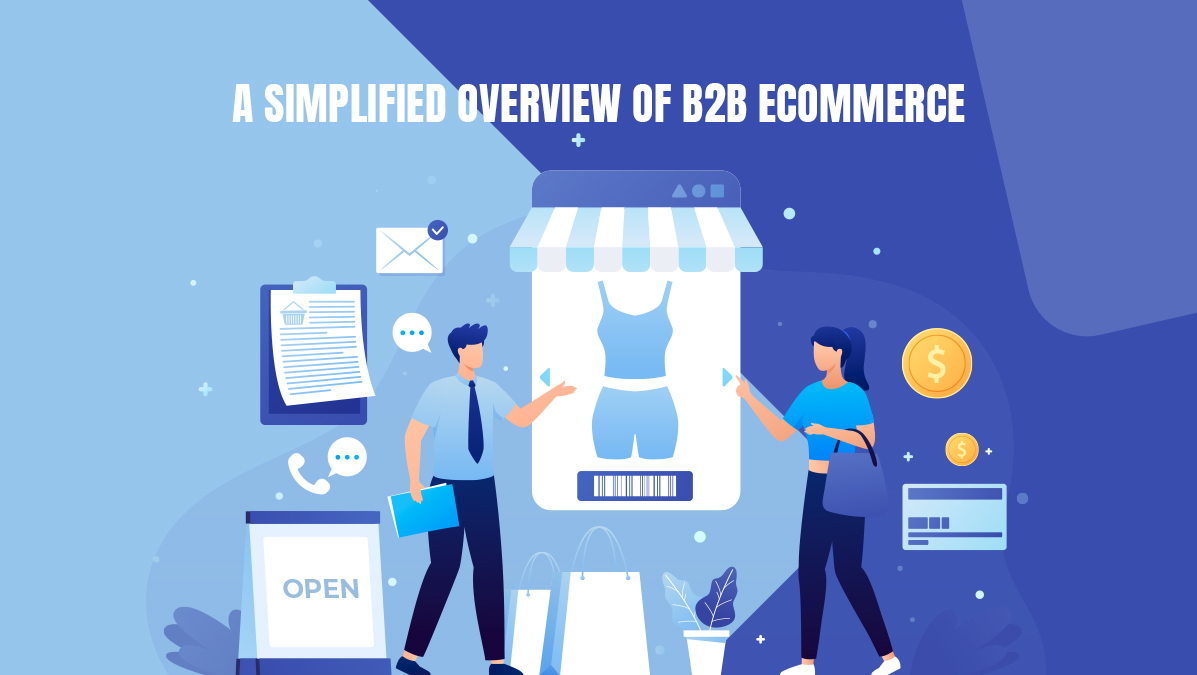In today’s interconnected digital landscape, the way businesses operate and transact has undergone a significant transformation. One of the most notable developments is the rise of B2B eCommerce, which refers to the online buying and selling of goods and services between businesses.
This article aims to provide a comprehensive and elaborate exploration of the features, benefits, and impact that B2B eCommerce has had on modern-day businesses.
Let’s begin by
Understanding the concept of B2B eCommerce
B2B eCommerce, short for business-to-business electronic commerce, involves commercial transactions conducted between two or more businesses through online platforms. Unlike B2C (business-to-consumer) eCommerce, where companies sell products or services directly to end consumers, B2B eCommerce focuses on catering to the needs of other businesses, such as manufacturers, wholesalers, distributors, and retailers.
Features of B2B eCommerce
· Robust Product Catalogs: B2B eCommerce platforms enable businesses to showcase and organize their extensive product catalogs in a digital format, making it easier for buyers to search, filter, and compare products. Detailed product descriptions, specifications, and images enhance the purchasing process, providing buyers with comprehensive information to make informed decisions.
· Personalized Pricing and Quoting: B2B eCommerce platforms allow businesses to offer personalized pricing based on factors such as order volume, customer loyalty, and negotiated agreements. This dynamic pricing model provides flexibility to both buyers and sellers, fostering long-term relationships and incentivizing increased order volumes. Additionally, B2B eCommerce platforms facilitate the generation of accurate and customized quotes, streamlining the quotation process and expediting order placement.
· Streamlined Order Management: B2B eCommerce provides comprehensive order management capabilities, enabling businesses to process and track orders efficiently. These platforms offer features such as automated order processing, order status tracking, and integration with inventory management systems. By automating these processes, businesses can minimize errors, reduce administrative overheads, and enhance operational efficiency.
· Secure Payment and Integration: B2B eCommerce platforms integrate with secure payment gateways, ensuring smooth and reliable transactions. This integration allows businesses to accept various payment methods, providing flexibility and convenience to buyers. Furthermore, integration with other business systems, such as ERP (Enterprise Resource Planning) and CRM (Customer Relationship Management), streamlines data flow, enhances operational visibility, and facilitates seamless order fulfillment.
Benefits of B2B eCommerce
· Increased Reach and Market Expansion: B2B eCommerce breaks geographical barriers, enabling businesses to reach a global audience without the need for a physical presence in multiple locations. This expanded market reach leads to increased sales opportunities and growth prospects. Small and medium-sized enterprises, in particular, can leverage B2B eCommerce to compete on a global scale and expand their customer base beyond traditional boundaries.
· Enhanced Customer Experience: B2B eCommerce platforms offer a seamless and user-friendly buying experience, empowering customers with 24/7 accessibility, self-service features, and real-time inventory visibility. Buyers can browse catalogs, place orders, and track shipments at their convenience. Additionally, personalized pricing, account-specific catalogs, and order history contribute to a personalized experience, making buyers feel valued and fostering long-term customer relationships.
· Cost Savings and Operational Efficiency: B2B eCommerce eliminates the need for manual, paper-based processes, reducing administrative overheads and minimizing errors. Automation of order processing, invoicing, and inventory management streamlines operations, leading to significant cost savings. Moreover, B2B eCommerce platforms provide real-time visibility into inventory levels, enabling businesses to optimize their supply chain, reduce stockouts, and eliminate excess inventory.
·Data-Driven Insights: B2B eCommerce platforms generate a wealth of data, ranging from customer behavior to sales trends. Businesses can leverage this data to gain valuable insights, identify market opportunities, and optimize their marketing and sales strategies. By analyzing customer preferences, buying patterns, and engagement metrics, businesses can tailor their offerings, improve targeting, and enhance customer satisfaction.
· Strengthened Customer Relationships: B2B eCommerce facilitates personalized and targeted communication with customers. Features such as personalized pricing, account-specific catalogs, and order history help businesses nurture long-term relationships. Regular communication, timely promotions, and tailored offerings based on customer preferences foster customer loyalty, resulting in increased customer retention and repeat business.
Impact on Modern-Day Businesses
· Digital Transformation: B2B eCommerce is a catalyst for digital transformation, pushing businesses to embrace technology-driven processes, automate operations, and adopt customer-centric approaches. The transition to B2B eCommerce compels businesses to reimagine their operations, invest in digital infrastructure, and align their strategies with the changing dynamics of the digital marketplace. This transformation enhances competitiveness and agility in the rapidly evolving business landscape.
· Disintermediation and Market Disruption: B2B eCommerce platforms have eliminated many traditional intermediaries, allowing businesses to interact directly with suppliers and buyers. This disintermediation has led to more streamlined supply chains, reduced costs, and increased transparency. Manufacturers can now reach retailers directly, bypassing multiple layers of distributors, resulting in improved profit margins and better control over product distribution.
· New Business Models and Revenue Streams: B2B eCommerce has opened up avenues for new business models, such as online marketplaces and subscription-based services. Online marketplaces provide a platform for businesses to connect and transact with a wide range of buyers and suppliers, facilitating collaborations and expanding business networks. Subscription-based models offer recurring revenue streams, providing stability and predictable income for businesses.
· Globalization and Market Access: B2B eCommerce has broken down international trade barriers, allowing businesses of all sizes to access global markets. Small and medium-sized enterprises, which traditionally faced limitations in reaching international markets, can now leverage B2B eCommerce to establish a global presence. The ability to trade with partners worldwide has created opportunities for cross-border collaborations, partnerships, and diversified supply chains.
· Improved Supply Chain Management: B2B eCommerce platforms facilitate seamless integration between suppliers, manufacturers, distributors, and retailers. Real-time visibility into inventory levels, demand patterns, and production schedules enables businesses to optimize their supply chains and respond quickly to changing market demands. By aligning supply with demand, businesses can minimize stockouts, reduce lead times, and improve overall supply chain efficiency.
Conclusion
B2B eCommerce has revolutionized the way businesses operate, transact, and interact with their customers and partners. Its features, benefits, and profound impact on modern-day businesses are undeniable. Embracing B2B eCommerce has become a necessity for companies looking to stay competitive, enhance customer experiences, and drive growth in the dynamic and digitally-driven business landscape of today and the future. By leveraging the power of B2B eCommerce, businesses can unlock new opportunities, expand their reach, and thrive in the fast-paced and interconnected global marketplace.
To delve deeper into B2B eCommerce, connect with an expert at 18th Digitech, the best web development company in India. Receive a personalized walkthrough today.








 About 18th Digitech
About 18th Digitech Awards and Credentials
Awards and Credentials Our Partners
Our Partners Press/Events
Press/Events
